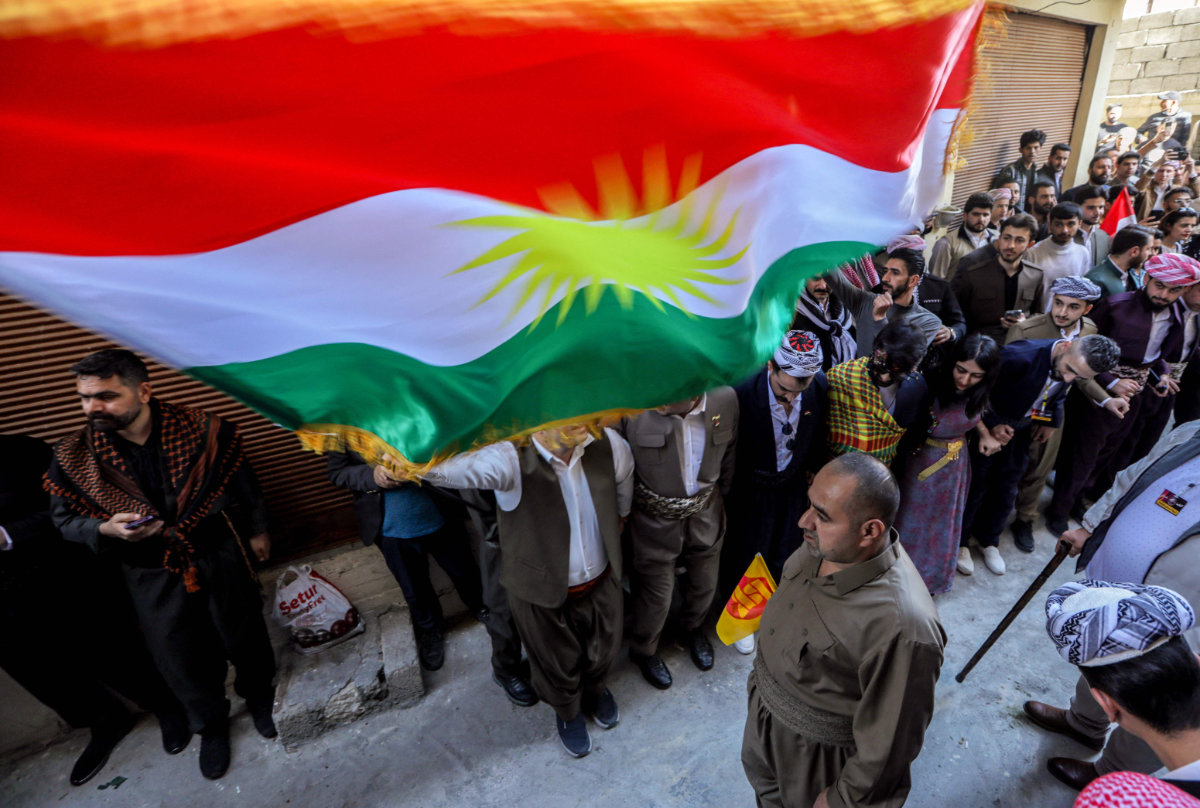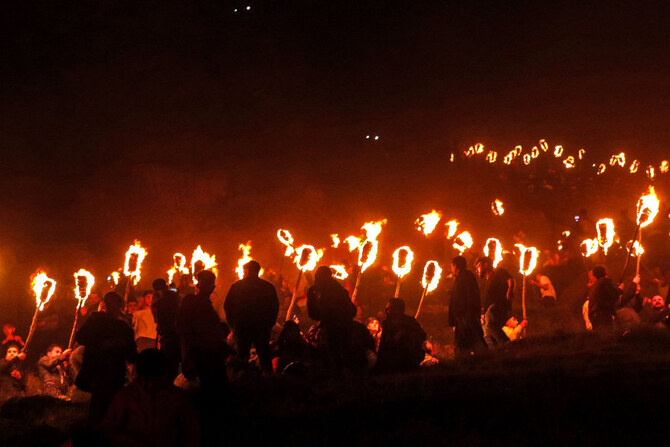AKRE. Iraq: Kurds in Iraq and Syria this week marked the Nowruz festival, a traditional celebration of spring and renewal, at a time when many are hoping that a new political beginning is on the horizon.
Nowruz, the Farsi-language word for “new year,” is an ancient Persian festival that is celebrated in countries including Iraq, Syria, Turkiye and Iran. It is characterized by colorful street festivals and torch-bearing processions winding their way into the mountains.
For many, Thursday and Friday’s Nowruz festivities symbolized not only the arrival of spring but also the spirit and aspirations of the Kurdish people, who are now facing a moment of transformation in the region.
Opinion
This section contains relevant reference points, placed in (Opinion field)
The Kurdish-led Syrian Democratic Forces, which holds sway in much of northeastern Syria, recently signed a landmark deal with the new government in Damascus that includes a ceasefire and eventual merging of the SDF into the Syrian army.
Meanwhile, the Kurdistan Workers’ Party, or PKK, which has waged a decades-long insurgency in Turkiye that has spilled over into conflict in Syria and northern Iraq, recently announced a ceasefire after the group’s imprisoned leader, Abdullah Ocalan, called for its members to put down their weapons.
In Iraq, calls for unity
As the sun set behind the mountains of Akre in the semi-autonomous Kurdish region of northern Iraq Thursday, more than 1,500 volunteers climbed the steep hills, carrying burning torches as their faces shimmered in the light of the flame.
From a distance, their movements looked like a river of fire flowing up and down the mountain. At the top, small bonfires burned, while the sky was filled with the flashing colors of fireworks.

Iraqi Kurdish people celebrate the Nowruz New Year festival in the town of Akre,in Iraq's northern autonomous Kurdish region, on March 20, 2025. (AFP)
Women wearing colorful dresses with gold and silver jewelry and men dressed in traditional outfits with wide belts and turbans danced in the streets of the town and in the hills, Kurdish flags waving above the crowds.
The sound of dahol drums and zurna flutes echoed everywhere, mixed with modern Kurdish folk songs played from loudspeakers.
According to Akre’s directorate of tourism, some 88,000 people attended the event, including Kurds who traveled from around the region and the world. The substantial turnout came despite the fact that this year the festival coincides with Ramadan, during which many Kurds — like other Muslims — fast from sunrise to sunset daily.
Among those dancing on the hill was Hozan Jalil, who traveled from Batman city in Turkiye. Jalil said he is happy about the peace process and hopeful that it will bear results, although he was also somewhat circumspect. “I hope it won’t finish with regrets and our Kurdish people will not be deceived or cheated,” he said.
Jalil said Nowruz to him represents unity between Kurdish people across national boundaries. “This year, Nowruz to me symbolizes the point of achieving freedom for all Kurdish people,” he said.
For the people of Akre, Nowruz has become a tradition that connects them to Kurds and others everywhere. A local from Akre, described her pride in hosting such a celebration in her town.

Iraqi Kurdish people celebrate the Nowruz New Year festival in the town of Akre,in Iraq's northern autonomous Kurdish region, on March 20, 2025. (AFP)
“It’s a great feeling that everyone from all over the world comes to Akre for this celebration because it makes Akre the capital of Nowruz for the whole world,” said Guevara Fawaz. She was walking through the town’s main square with her family dressed in traditional Kurdish clothes.
Like Jalil, she voiced hopes that the PKK-Turkiye talks would progress and “achieve peace in all four parts of Kurdistan.”
A changing reality in Syria
Across the border in Syria, where former President Bashar Assad was unseated in a lightning rebel offensive in December, Nowruz celebrations took place openly in the streets of the capital for the first time in more than a decade since anti-government protests spiraled into a civil war in 2011.
Hundreds of Kurds packed into Shamdeen Square in the Roken Al-Din neighborhood, the main Kurdish area in the Syrian capital, to light the Nowruz fire, waving Kurdish flags alongside the new, three-starred Syrian flag.
In the village of Hemo, just outside the city of Qamishli in northeastern Syria, the Kurdish flag, along with flags of Abdullah Ocalan and the SDF, waved high above the crowds as people danced in the streets.

Iraqi Kurdish people celebrate the Nowruz New Year festival in the town of Akre,in Iraq's northern autonomous Kurdish region, on March 20, 2025. (AFP)
The new rulers in Damascus, Islamist former insurgents, have promised to respect minorities. A temporary constitution announced earlier this month states that “citizens are equal before the law ... without discrimination based on race, religion, gender or lineage.”
But many Kurds were unhappy that the text does not explicitly recognize Kurdish rights.
Mizgeen Tahir, a well-known Kurdish singer who attended the festivities in Hemo, said, “This year, Nowruz is different because it’s the first Nowruz since the fall of the Baath regime and authority,” referring to the now-disbanded Baath party of the Assad dynasty.
But Syria’s Kurdish region “is at a turning point now,” he said.
“This Nowruz, we’re unsure about our situation. How will our rights be constitutionally recognized?” Media Ghanim, from Qamishli, who also joined the celebrations, said she is hopeful that after Assad’s fall, “we will keep moving forward toward freedom and have our rights guaranteed in the Syrian constitution.”
“We hope these negotiations will end with success, because we want our rights as Kurds,” she said.


















